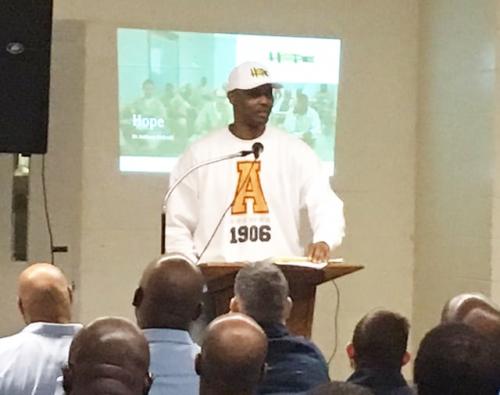LEJA Professor Bringing 'HOPE' to Illinois Prison
June 12, 2020
MACOMB, IL – An effort to put the concept of restorative justice into practice for Western Illinois University Law Enforcement and Justice Administration students has led one faculty member to bring "HOPE" to a local prison.
LEJA Professor Anthony McBride asked inmates at the Henry C. Hill Correctional Facility in Galesburg, IL to take a pledge. McBride said the idea uses a technology platform, such as Zoom, to bring HOPE into the prison system by using restorative justice to teach offenders about repairing the harm done to their victim or victims and to the community. It also has a goal of offenders leaving prison in a better place than when they started serving their sentence.
"The idea of instilling HOPE in offenders is so they may one day take responsibility for their actions, understand how their crime impacted their communities and then come to a place where they can be reformed and accepted back into society," McBride said. "This idea manifests in the roots of the restorative justice philosophy that views three parties with very important value and roles in the process of justice, victims, offenders and communities, a totally different criminal justice perspective that sought to focus most of its attention on the offender."
Through the program, McBride asks the offenders to make the following pledge:
Today I pledge to let go of all the anger and the negative images I established prior to my incarceration.
Today I pledge to develop a skill and obtain some education during my rehabilitation process.
Today I pledge to admit that I have hurt someone and will work to make sure this will never happen again.
Today I pledge to do the right thing in my search of discovering internal hope and when I finally conquer my hope, I pledge to never let it go.
Today I pledge to love myself, my family, others around me and outside of me and when those who has lost hope in me see me again they will be surprised.
And, when I re-enter society, I will enter as a changed man and pledge to serve/educate others. And if I never get released, I pledge to serve/educate my peers so one day they can say I met someone that guided me to my journey of finding hope.
Today I pledge for internal hope.
Based on letters McBride has received from inmates he has asked to take the HOPE pledge, McBride said they would like to see more programming become more permanent. That process has not yet started because of the coronavirus pandemic. After the pandemic, the plan is to bring the program back into prisons and involve students in the process.
McBride said the administration at the Galesburg prison has been gracious over the years to allow WIU LEJA students into the medium-security facility for tours and to hear from and speak to inmates. He spoke to the inmates about HOPE in February as part of Black History Month.
"The staff and inmates are open to restorative philosophy and programming ideas and, on occasion, request faculty to present to their inmates," he said. "Over the years, as I take students to visit correctional institutions, I notice that some students have some anxiety as they don't know what to expect when entering a medium correctional institution. Most of the anxiety I sense comes from what they watched on television series that depict crime and fear. These shows can scare students away from careers in corrections. Part of the goal of the visit and presentation is to address some of these concerns and anxiety."
McBride said the corrections opportunity also provides him the opportunity to interact with students outside the classroom and to see them grow personally from the experience.
"I believe in order for our students to confront myths they have been told or what they believe they've witnessed, they must first get to know that population to form their own understanding," he said. "When our students get the opportunity to speak with and listen to inmates talk about their crimes and how they victimized their victim(s) and communities, this is where our students begin to connect the value of social responsibilities. The stories the inmates share are gruesome, sad, painful and hurtful. Students learn that some crimes committed are more than just about free will or choice. There are factors that contribute to an individual committing a crime(s), such as age, mental health conditions, psychological, biological and other mitigating factors."
The inmates involved experience a "sense of relief," McBride said, when they talk with students about their cases. He added that he sees the inmates demonstrating ownership for their actions.
LEJA graduate student Patrice Winters, of Bellwood, IL, has visited the Galesburg prison on several occasions and said she has seen first-hand during her time working with offenders that rehabilitation is possible.
"Everyone has a story; everyone makes mistakes; and throughout all the bad, there may be some good still there," she said. "I've always wondered how inmates felt about being locked in a facility, always wondered how those who have been incarcerated for 30 years or more felt and even wondered how correctional officers and workers felt about their inmates as well. Thanks to Anthony McBride I was not only able to ask questions to inmates, but I had the opportunity to be up close, personal and even gain professional relationships with them."
Winters said meeting with inmates has given her an insight into life in prison, a place she never thought she would see. She said her experiences have changed her career goals so she is considering working in a correctional facility after graduation.
During her visits to the Galesburg prison, Winters said she developed the opinion that programs like the one developed by McBride provide resources and opportunities to inmates. She met with inmates multiple times and was surprised what she learned from them.
"No handcuffs, no guns, no weapons, just me, a small group of students and a small group of criminally-convicted inmates," she said. "It sounds like it could be scary, but it was amazing - literally the best, most exciting experience of my life and I am truly grateful. More criminal justice students need to see and have the experience I was able to have."
For more information about the LEJA program at WIU, visit wiu.edu/LEJA.
Posted By: Jodi Pospeschil (JK-Pospeschil@wiu.edu)
Office of University Communications & Marketing



Connect with us: